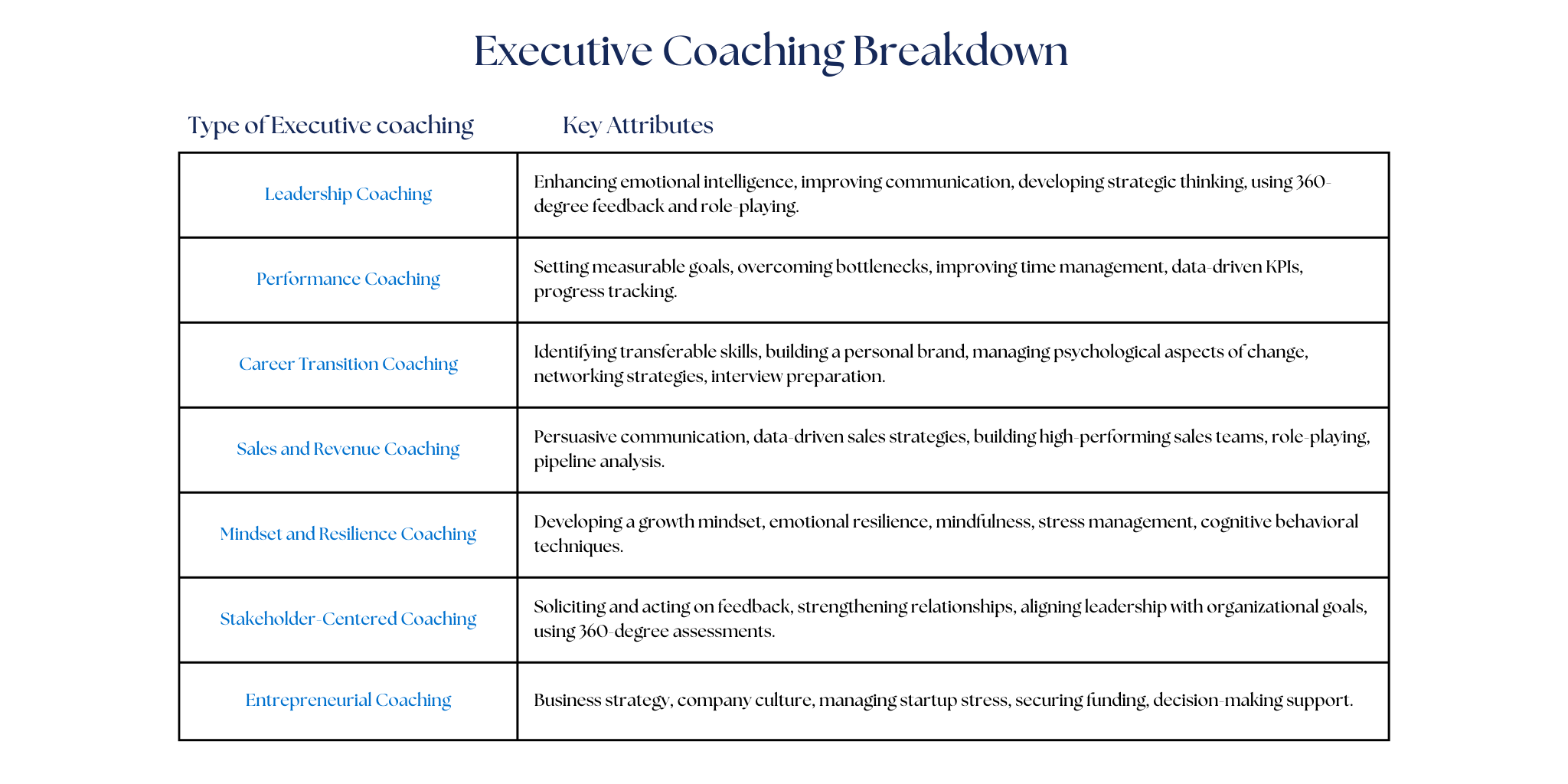Executive coaching has become an indispensable tool for leaders aiming to elevate their performance, navigate challenges, and achieve their full potential. With the business landscape evolving quickly, executives need tailored guidance to stay ahead. However, not all executive coaching is the same. Depending on your goals, industry, or challenges, you might benefit from a specific type of coaching.
This article will explore seven different types of executive coaching, breaking them down by focus areas, coaching styles, and industry-specific approaches. Whether you’re a seasoned CEO, a startup founder, or a leader transitioning into a new role, this guide will help you identify the right coaching style for your needs.
1. Leadership Coaching: Building the Leaders of Tomorrow
Leadership coaching is one of the most sought-after forms of executive coaching. It focuses on helping executives develop critical leadership skills, emotional intelligence, and decision-making abilities. Leaders are often responsible for guiding their organizations through uncertainty; this coaching gives them the tools to do so effectively.
Key Focus Areas:
- Enhancing emotional intelligence (EQ) to build stronger relationships.
- Improving communication skills to inspire and motivate teams.
- Developing strategic thinking to make better decisions under pressure.
According to a study by the International Coaching Federation (ICF), 86% of companies reported recouping their investment in coaching, with leadership development being a primary driver. Leadership coaching often involves 360-degree feedback, role-playing, and personalized action plans to address specific gaps.
For example, a CEO struggling to manage a diverse team might work with a coach to develop inclusive leadership practices. Leadership coaching focuses on self-awareness and adaptability and helps executives become more effective and empathetic leaders.
2. Performance Coaching: Driving Results and Efficiency
Performance coaching is all about results. This type of executive coaching focuses on improving productivity and efficiency and achieving specific business goals. It’s ideal for executives who want to optimize performance or help their teams hit key metrics.
Key Focus Areas:
- Setting and achieving measurable goals.
- Identifying and overcoming performance bottlenecks.
- Enhancing time management and prioritization skills.
A report by PwC found that coaching can deliver a 7x return on investment, with performance improvements being a significant contributor. Performance coaches often use data-driven approaches, such as KPIs and progress tracking, to ensure their clients stay on track.
For instance, a sales director might use performance coaching to refine their team’s sales process, leading to a 20% increase in revenue. By focusing on actionable strategies, performance coaching ensures that executives meet and exceed their targets.
3. Career Transition Coaching: Navigating New Horizons
Career transitions are challenging, even for seasoned executives. Whether you are stepping into a new role, changing industries, or preparing for retirement, career transition coaching provides essential support to navigate these changes effectively. Embrace the opportunity for growth and ensure a successful transition.
Key Focus Areas:
- Identifying transferable skills and strengths.
- Building a personal brand for new opportunities.
- Managing the emotional and psychological aspects of change.
A survey by Right Management found that 65% of employees who received career coaching felt more confident in their ability to manage their careers. Career transition coaches often use assessments, networking strategies, and interview preparation to help executives land their next significant role.
For example, a CFO transitioning to a CEO role might work with a coach to develop a broader strategic mindset and build relationships with key stakeholders. Career transition coaching helps leaders embrace change with confidence by providing clarity and direction.

4. Sales and Revenue Coaching: Mastering the Art of Selling
Sales and revenue coaching is effectively tailored for executives in sales-driven roles, such as sales managers and Chief Revenue Officers (CROs). This type of coaching empowers you to enhance your strategies, uplift your team’s motivation, and ultimately close more deals. Investing in this coaching will equip you with the tools and insights needed to succeed in your leadership role.
Key Focus Areas:
- Developing persuasive communication skills.
- Creating data-driven sales strategies.
- Building high-performing sales teams.
According to CSO Insights, companies with dynamic coaching cultures achieve 28% higher win rates. Sales and revenue coaches often use role-playing, pipeline analysis, and customer feedback to help executives improve their sales processes.
For example, a Vice President of Sales may leverage coaching strategies to implement a new CRM system within their team successfully. Organizations can improve individual and team performance by focusing on tailored sales and revenue coaching. This targeted approach equips sales professionals with essential skills and techniques and drives measurable business outcomes through increased efficiency and higher revenue generation.
5. Mindset and Resilience Coaching: Thriving Under Pressure
The higher you climb the corporate ladder, the more pressure you face. Mindset and resilience coaching help leaders manage stress, build mental toughness, and maintain peak performance in high-stakes environments.
Key Focus Areas:
- Developing a growth mindset to embrace challenges.
- Building emotional resilience to bounce back from setbacks.
- Practicing mindfulness and stress management techniques.
A study by “The Center For Workplace Mental Health” found that 76% of professionals have experienced burnout at their current job, highlighting the need for resilience coaching. Coaches in this space often use cognitive behavioral therapy (CBT), mindfulness exercises, and goal setting to help executives stay grounded.
For instance, a startup founder experiencing burnout may engage with a coach to establish more effective work-life boundaries and develop coping strategies. This coaching methodology aims to foster resilience, thereby enabling leaders to thrive in the face of adversity.
6. Stakeholder-Centered Coaching: Leading with Feedback
Stakeholder-centered coaching is a structured approach that gathers feedback from colleagues, direct reports, and other stakeholders to drive leadership growth. This type of executive coaching is particularly effective for leaders looking to improve their
influence and impact.
Key Focus Areas:
- Soliciting and acting on constructive feedback.
- Building stronger relationships with stakeholders.
- Aligning leadership behaviors with organizational goals.
Research by the Harvard Business Review shows that leaders who actively seek feedback are rated more effective by their peers. Stakeholder-centered coaches often use 360-degree assessments and action plans to ensure continuous improvement.
For example, a COO may utilize this coaching style to address communication gaps within their team, resulting in enhanced collaboration and morale. By concentrating on stakeholder perceptions, leaders can develop greater self-awareness and effectiveness.
7. Entrepreneurial Coaching: Navigating the Startup Journey
Entrepreneurial coaching is designed for startup founders and business owners navigating the unique challenges of building and scaling a business. From securing funding to managing rapid growth, this type of executive coaching provides the guidance entrepreneurs need to succeed.
Key Focus Areas:
- Developing a clear vision and business strategy.
- Building a strong company culture.
- Managing the emotional rollercoaster of entrepreneurship.
A study has revealed that 83% of startups that have coaching view their chances of success as much higher compared to those that do not. Entrepreneurial coaches often act as sounding boards, helping founders make tough decisions and focus on their goals.
For instance, a tech startup founder may utilize coaching to enhance their pitch deck, leading to a successful funding round. Entrepreneurial coaching offers both strategic and emotional support, assisting founders in realizing their visions.

Conclusion: Choosing the Right Executive Coaching for You
Executive coaching is a personalized solution, not a one-size-fits-all approach. The right coaching style for you depends on your unique goals, challenges, and industry. Whether you aim to enhance your leadership skills, boost your performance, or navigate a career transition, there’s a coaching style tailored to your needs.
Investing in the right coaching to maximize your potential and drive positive change for your team and organization is crucial. By investing in executive coaching courses, you’re not just improving your own capabilities—you’re driving positive change for your team and organization. So, take the time to explore these seven types of coaching and identify the one that aligns with your aspirations.
Remember, the best leaders are those who never stop learning. With the right coach by your side, the possibilities are endless. So, take the time to explore these seven types of coaching and identify the one that aligns with your aspirations. By investing in executive coaching, you’re not just improving your capabilities but driving positive change for your team and organization.

